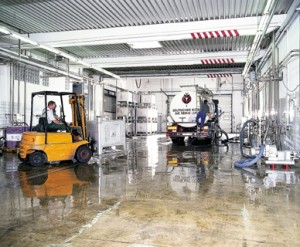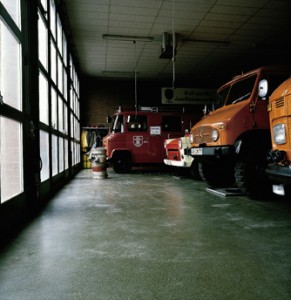Concrete Floor Strength: Does Your Floor Have It?
Concrete Floor Strength & What it Means
Sometimes over heard is the phrase “hard as concrete,” but is concrete truly hard? Even the Romans knew about concrete and used it extensively to construct many of the buildings that are still standing today, and all this without the rebars (steel reinforcement bars) that we use today to give a concrete floor strength. It appears that concrete went through many changes in history, meaning that humans learned that certain additives changed the strength of concrete. For instance, adding horse hair to it made it least likely to crack while the addition of volcanic ash actually enabled concrete to harden while under water! Did you know that adding blood to concrete will make it much more frost resistant? The Romans added blood to many items in history, as their sports frequently had blood involved in them as we all know.
Today scientists toss around various words having to do with concrete such as their cemetitious and aggregate phases, but at least today we have the “recipes” for many different kinds of concrete and have learned that rebars are essential to hold concrete together. Thus we have learned to make concrete with a strong bond enough to utilize it to make skyscrapers, all out of concrete and steel.
When speaking of concrete floor strength though, we do not always have the additional strength that rebars give us, and concrete is not really that hard. For instance it can conservatively be said that the majority of concrete is as a rule rated for 4000 psi (Pounds per Square Inch). Thus the concrete floor strength is often aided by having something on top of the concrete to make it stronger.
Enter a product called Silikal. Silikal is actually a concrete floor strength-giver. It essentially protects the concrete flooring so that nothing can damage it. Looking at, for instance, a garage whereby cars drive on the concrete that is already on their floor, one would think that the weight of the cars, the traction from its tires would damage the concrete floor. One would be correct, and this is why many garages use Silikal to protect their concrete floors.
One of the most punishing pieces of equipment one can put onto concrete is a forklift. However, forklifts are absolutely essential to any pallet-racking warehouse. On the other hand, not only does the weight of a forklift account for damage to the floors, but also the fact that parked forklifts are known to leak a number of damaging liquids, such as battery acid, and hydraulic fluids, as well as oil. All of these factors play an important part in reducing concrete floor strength, yet Silikal will not allow any of these things to diminish the strength of concrete.


